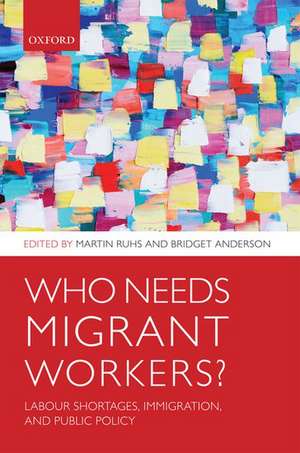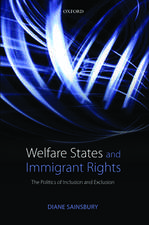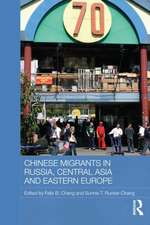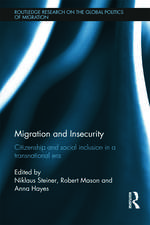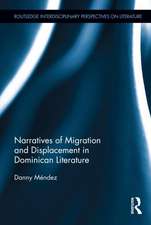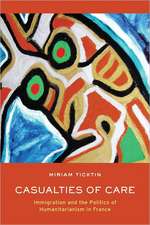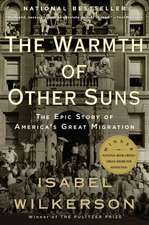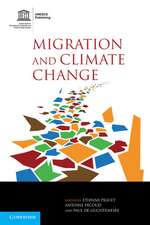Who Needs Migrant Workers?: Labour shortages, immigration, and public policy
Editat de Martin Ruhs, Bridget Andersonen Limba Engleză Paperback – 17 mai 2012
| Toate formatele și edițiile | Preț | Express |
|---|---|---|
| Paperback (1) | 346.99 lei 31-37 zile | |
| Oxford University Press – 17 mai 2012 | 346.99 lei 31-37 zile | |
| Hardback (1) | 501.02 lei 31-37 zile | |
| OUP OXFORD – 26 aug 2010 | 501.02 lei 31-37 zile |
Preț: 346.99 lei
Preț vechi: 402.57 lei
-14% Nou
Puncte Express: 520
Preț estimativ în valută:
66.39€ • 69.51$ • 54.94£
66.39€ • 69.51$ • 54.94£
Carte tipărită la comandă
Livrare economică 26 martie-01 aprilie
Preluare comenzi: 021 569.72.76
Specificații
ISBN-13: 9780199653614
ISBN-10: 0199653615
Pagini: 352
Ilustrații: 10 Figures, 30 Tables
Dimensiuni: 155 x 234 x 20 mm
Greutate: 0.52 kg
Editura: Oxford University Press
Colecția OUP Oxford
Locul publicării:Oxford, United Kingdom
ISBN-10: 0199653615
Pagini: 352
Ilustrații: 10 Figures, 30 Tables
Dimensiuni: 155 x 234 x 20 mm
Greutate: 0.52 kg
Editura: Oxford University Press
Colecția OUP Oxford
Locul publicării:Oxford, United Kingdom
Recenzii
Population scientists and practitioners will find this volume exceptionally helpful.
Who Needs Migrant Workers? should be highly recommended to anybody interested not only in immigration but in the governance of modern economies and labour markets in general.
The books chapters alongside short commentaries, which follow them, provide an authoritative and valuable source for industrial relations scholars interested in migration.
The volume is excellent, and the sectoral studies provide a wealth of data on the unique character of labour demand in each. The editors provide a thoughtful and careful meditation on the complexities.
Highly welcome... probably the most accessible set-piece introduction to migrant work in the UK yet published... Population scientists and practitioners will find this volume exceptionally helpful...the book both explicitly and implicitly provides valuable insights for both sending and receiving countries the world over.
A masterful volume on the role of immigration policy in addressing current and future labor shortages. Drawing on a stellar group of experts, the edited volume addresses the employment of foreign workers in a wide range of industries at all skill levels. This comprehensive review of migrant worker programs is a welcome compendium for academics, practitioners and policy makers alike.
Ruhs and Anderson have put together a terrific team to analyse immigration for work in the UK. An excellent overview by the editors is followed by detailed studies of six sectors: health; social-care; hospitality; food production; construction; and financial services. This is the definitive research on the demand for migrant workers and will inform the debate for years to come.
How labour migration can and should be regulated is one of the most pressing issues of our time. This excellent book is a feasibility study dealing with perceived staff shortages. It provides substantial insights by an outstanding group of scientists and contributes significantly to our understanding of an extremely contentious policy problem.
In good times many people profit from the goods and services produced by migrant workers. In times if crisis the same people see them as unfair competitors. This masterly written and edited book fights prejudices with empirical evidence from the UK on labour shortage and the ways in which such gaps can be filled. This is of significance well beyond the UK. It is a must read for everyone interested in migration policy development and the evolution of labour markets.
Who Needs Migrant Workers? presents both a rigorous analytical methodology to measure labor shortages and a practical conceptual framework to assess whether migrants should be imported to fill those shortages Who Needs Migrant Workers? is must reading for all who are interested in this important subject.
Those searching for a proper sense of perspective on [the debate over migrant workers] will welcome this volume.
Who Needs Migrant Workers? should be highly recommended to anybody interested not only in immigration but in the governance of modern economies and labour markets in general.
The books chapters alongside short commentaries, which follow them, provide an authoritative and valuable source for industrial relations scholars interested in migration.
The volume is excellent, and the sectoral studies provide a wealth of data on the unique character of labour demand in each. The editors provide a thoughtful and careful meditation on the complexities.
Highly welcome... probably the most accessible set-piece introduction to migrant work in the UK yet published... Population scientists and practitioners will find this volume exceptionally helpful...the book both explicitly and implicitly provides valuable insights for both sending and receiving countries the world over.
A masterful volume on the role of immigration policy in addressing current and future labor shortages. Drawing on a stellar group of experts, the edited volume addresses the employment of foreign workers in a wide range of industries at all skill levels. This comprehensive review of migrant worker programs is a welcome compendium for academics, practitioners and policy makers alike.
Ruhs and Anderson have put together a terrific team to analyse immigration for work in the UK. An excellent overview by the editors is followed by detailed studies of six sectors: health; social-care; hospitality; food production; construction; and financial services. This is the definitive research on the demand for migrant workers and will inform the debate for years to come.
How labour migration can and should be regulated is one of the most pressing issues of our time. This excellent book is a feasibility study dealing with perceived staff shortages. It provides substantial insights by an outstanding group of scientists and contributes significantly to our understanding of an extremely contentious policy problem.
In good times many people profit from the goods and services produced by migrant workers. In times if crisis the same people see them as unfair competitors. This masterly written and edited book fights prejudices with empirical evidence from the UK on labour shortage and the ways in which such gaps can be filled. This is of significance well beyond the UK. It is a must read for everyone interested in migration policy development and the evolution of labour markets.
Who Needs Migrant Workers? presents both a rigorous analytical methodology to measure labor shortages and a practical conceptual framework to assess whether migrants should be imported to fill those shortages Who Needs Migrant Workers? is must reading for all who are interested in this important subject.
Those searching for a proper sense of perspective on [the debate over migrant workers] will welcome this volume.
Notă biografică
Martin Ruhs' research focuses on the economics and politics of labour immigration, with a strong international comparative dimension. Recent publications include 'Economic Research and Labour Immigration Policy' and 'Semi-compliance and illegality in migrant labour markets.' Martin is a member of the Migration Advisory Committee (MAC), a highly influential body of independent academic economists advising the UK government on labour immigration policy. He was Specialist Adviser to a recent House of Lords Economic Affairs Committee Inquiry into the economic impacts of immigration in the UK. He has provided migration policy analysis and advice for various national governments and international institutions including the International Labour Organisation (ILO), the International Organisation for Migration (IOM), the Global Commission on International Migration (GCIM) and the United Nations Development Programme (UNDP).Bridget Anderson's research interests include low waged labour migration, legal status, and citizenship. Publications include 'Migrants and Work Related Rights' (Ethics and International Affairs 2008), and Doing the Dirty Work? The global politics of Domestic Labour (Zed Books 2000). She has worked with the Trades Union Congress, the Organisation for Security and Co-operation in Europe, the International Labour Organisation, and a wide range of national and international NGOs.
